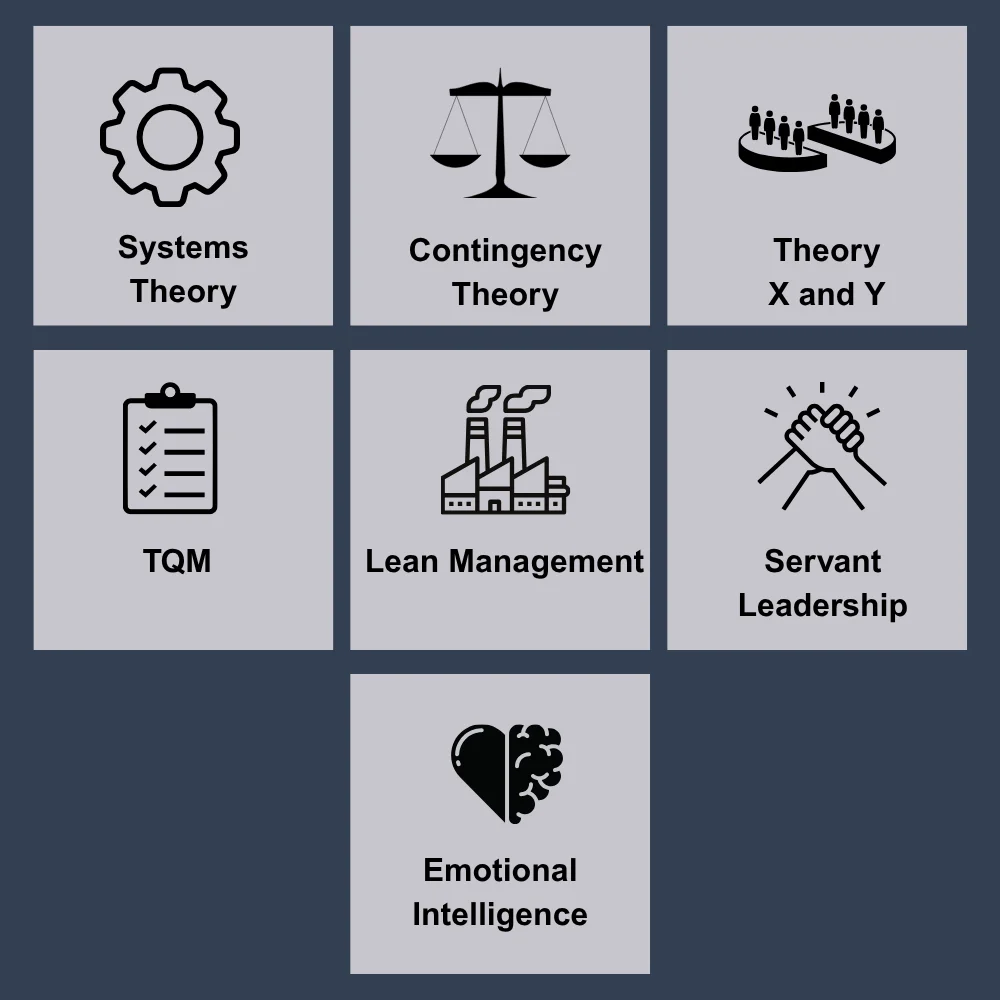Modern management is all about leading people, making good decisions, and keeping things running smoothly. Over the years, new theories have helped leaders and businesses handle complex situations better. These theories guide managers in organizing work, motivating employees, and building stronger teams. Whether you’re running a small business or leading a large organization, understanding these modern approaches can help you manage people and projects more effectively.
Understanding the Core Theories of Modern Management
Below are seven widely used modern management theories that continue to shape workplaces and leadership styles across industries today.

1. Systems Theory
Systems Theory views an organization as a complete system made up of smaller parts. Each part works together and affects the whole. This theory teaches us that everything inside a business like departments, employees, machines, and even customers is connected.
Instead of seeing problems separately, managers using Systems Theory look at how things interact. For example, if sales go down, it might not be just a sales issue. It could be caused by problems in production or marketing. Managers who follow this theory work to improve the flow and communication between departments. They believe in teamwork and finding the root of the problem rather than just fixing surface issues.
Key ideas of Systems Theory:
- All departments and people are connected
- A change in one part affects others
- Focus on the bigger picture
- Solving problems by improving the whole system
2. Contingency Theory
Contingency Theory suggests that there is no universal approach to managing teams or handling problems. A strategy that proves effective in one scenario may not be suitable in another. Therefore, leaders must adjust their management style according to the specific circumstances, team dynamics, and nature of the task at hand.
For example, a strict leadership style might work well in a factory but fail in a creative agency. This theory tells managers to study the situation before making decisions. They must think about team size, available resources, deadlines, and even company culture.
Main points of Contingency Theory:
- No one-size-fits-all method
- Decisions depend on the situation
- Managers must be flexible
- Understanding context leads to better outcomes
3. Theory X and Theory Y
Introduced by Douglas McGregor, this theory talks about two very different views of workers. Theory X managers believe employees are lazy and need constant supervision. They believe that individuals are motivated solely by money and tend to avoid taking responsibility. As a result, such managers often implement strict policies and maintain tight supervision over their teams
Theory Y managers, on the other hand, believe employees enjoy work and want to do a good job. They trust their team, give them more responsibility, and encourage growth. This leads to a more relaxed and creative workplace. Managers today are moving toward Theory Y as it builds trust and keeps employees motivated.
Differences between Theory X and Theory Y:
- Theory X: strict control, low trust, limited creativity
- Theory Y: trust, motivation, employee involvement
Workers perform better when treated with respect and responsibility
4. Total Quality Management (TQM)
TQM is all about improving quality in every part of a business. It’s not just about products it’s about how teams work, how services are delivered, and how customers are treated. This theory says that everyone in the company, from top managers to new employees, should focus on improvement.
Managers using TQM encourage teamwork, communication, and customer feedback. They track performance regularly and fix problems as early as possible. Companies like Toyota and Samsung have used this approach to become leaders in their industries.
Core concepts of TQM:
- Continuous improvement in everything
- Customer satisfaction is the main goal
- Involves all employees
- Use data to make decisions
5. Lean Management Theory
Lean Management comes from Japanese manufacturing, especially Toyota. The idea is simple: do more with less. That means reducing waste, speeding up processes, and delivering value to customers quickly.
This theory helps managers cut out unnecessary steps in work processes. It encourages workers to suggest improvements and take ownership of their tasks. It’s commonly used in production, but even software companies and hospitals now use Lean principles.
Basic principles of Lean Management:
- Eliminate waste (like time or materials)
- Focus on value for the customer
- Improve processes continuously
- Empower employees to solve problems
6. Servant Leadership Theory
Servant Leadership flips the traditional leadership model. Instead of being the boss who gives orders, the leader supports the team and helps them succeed. The focus is on serving employees so they can do their best work.
Managers who use this style listen to their teams, care about their well-being, and focus on personal growth. It creates a culture of trust and respect. This theory is becoming more popular, especially in organizations that care about employee happiness and long-term success.
Key traits of servant leaders:
- Listening more than commanding
- Helping others grow
- Building trust and community
- Putting people first
7. Emotional Intelligence Theory
Emotional Intelligence (EI) refers to the capacity to recognize, understand, and effectively manage both your own emotions and the emotions of others. This theory says that great managers are not just smart they’re also emotionally aware.
A manager with high emotional intelligence knows how to stay calm under pressure, solve conflicts, and understand team members’ emotions. They inspire loyalty and teamwork because they treat everyone with empathy and fairness. Emotional Intelligence is especially important for leading diverse teams or handling stressful projects.
Five components of Emotional Intelligence:
- Self-awareness
- Self-regulation
- Motivation
- Empathy
- Social skills
Final Thoughts
Modern management is no longer just about giving orders. It’s about building relationships, improving systems, and adapting to change. These seven management theories show how far leadership has come. From emotional intelligence to servant leadership and lean methods, each theory offers valuable tools to lead better and create a healthier work environment. Whether you’re a student, business owner, or team leader, applying even one of these ideas can make a big difference in how you manage people and projects.



